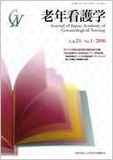Japanese
English
- 販売していません
- Abstract 文献概要
- 参考文献 Reference
抄録
本研究の目的は,自力歩行が困難な高齢者の生きる意味,目的,いまを支えるものを明らかにすることである.対象は介護老人保健施設に入所している6人で,半構造化面接によってライフストーリーを聴き取り,逐語録に起こし,質的帰納的に分析し,6人のサブテーマを統合して5つのテーマを抽出した.地域高齢者のスピリチュアリティと一致する「頑張ったからこそある満足感」「過去・現在・未来の人とのつながり」「命はもらったもの,生かされている」のほかに「不自由でもできることは自分でしたい」「いまがいちばんいいとき」が抽出された.生きる意味,目的,支えを聴き取ることは,老健で生活する高齢者の自己の客観視を可能にすること,および看護が充実する可能性があり,そのような視点を取り入れたケアの必要性が示唆された.
This study aimed to clarify the significance of life for the elderly with difficulty in walking independently, their purposes in life, and factors supporting their life-fulfillment. Semi-structured interviews were conducted with 6 long-term care health facility residents to extract their life stories, and create narrative records. The narrative records were qualitatively and functionally analyzed, and classified into 5 categories and 6 sub-categories: in addition to <satisfaction after efforts>, <past, present, and future interpersonal relationships>, and <life as a gift and an opportunity to learn its significance>, representing the spirituality of elderly community residents, <wishing to make my own decisions>, and <now is the best time of my life> were extracted. Listening to the elderly living in long-term care health facilities, focusing on the significance and purpose of life, as well as factors contributing to life-fulfillment, may enable them to develop self-insight, and improve the quality of nursing, and it may be necessary to provide care from such a perspective.
Copyright © 2016, Japan Academy of Gerontological Nursing All rights reserved.


